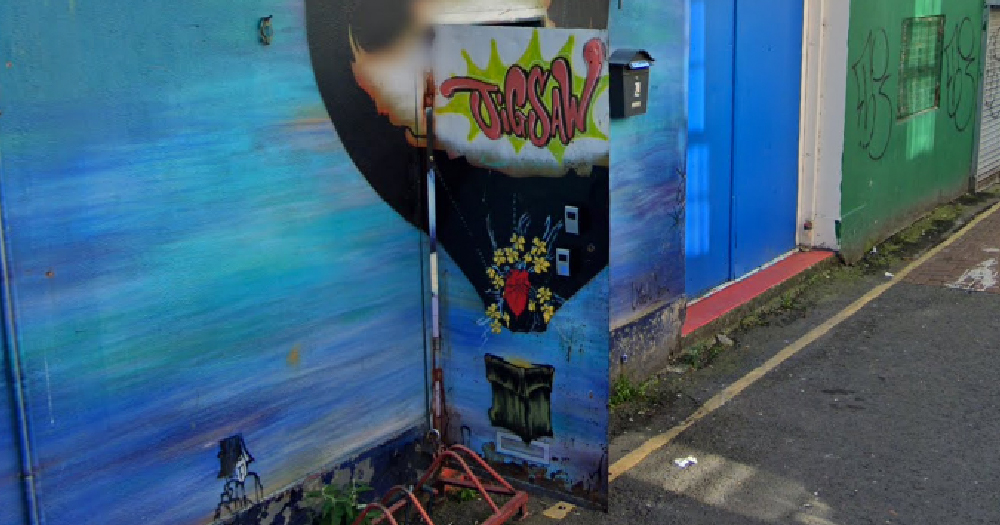Many in the queer community and beyond are dismayed at the announcement that the beloved underground cultural space Jigsaw is closing. The venue, which is located near Mountjoy in Dublin City, was the home of Dublin Digital Radio, the Workers Solidarity Movement and queer performance night Glitter Hole, among others.
In their statement on the closure, DDR said “there wasn’t another dance floor, anywhere, that had the energy it packed into even an average night; the respect that dancers had for each other, the camaraderie on the dancefloor, the feeling of freedom and the luxury of being able to express yourself without limits.”
Reflecting similar sentiments, Glitter Hole commemorated the shutdown with a series of photos on Instagram, saying “It was our home and it was sacred”. Twitter user @nereafercor described Jigsaw as “a safe space for all queer, migrant and lefties”.
RIP my beautiful Jigsaw, home of many souls who loved their Dubliner community so much they created a safe space for all queer, migrant and lefties. Jigsaw was deatach, the family gathering together around the fire.
— Nerea Fdez. Cordero?? (@nereafercor) April 26, 2021
https://twitter.com/ciaraisfabbb/status/1386984357286535170
The space originally emerged in 2004 as Seomra Spraoi, an autonomous social centre run by a “non-hierarchical, anti-capitalist collective on a not-for-profit basis”. Seomra Spraoi was forced to shut in 2015 after a Garda Síochána raid and was later redeveloped as a gig venue under the name Jigsaw by former participants. Since then, the space continued to be used for social organising as well as cultural events.
In responding to the closure of ‘Jigsaw’, many are reflecting on the closure of other cultural spaces in Dublin. Art and music space JaJa Studios has been crowdfunding during the pandemic after being threatened with eviction, while in 2019, well known Dublin pub The Bernard Shaw was forced to relocate. Some have also referenced the forced closure of the collective arts centre The Exchange back in 2014.
The fact that our city can't support places like Jigsaw or the Exchange is a disgrace. I am interested in hearing your ideas on what we can do to better support these spaces!
— ?? Cllr Declan Meenagh ??️♿ #RefugeesWelcome (@declancabra) April 27, 2021
Very sorry to see the news about Jigsaw. It’ll be sorely missed from the area & the city in general. It’s essential that we fight for more cultural spaces, especially community ones like Jigsaw & The Exchange (closed in 2014).
— The Big Romance (@BigRomanceBar) April 26, 2021
Many are also speaking of the role rising rents have played in squeezing out alternative or non-profit spaces. In DDR’s statement, they say “having a spaced that nurtured us in our early years made us realise the sterilising effect that high rents are having in this city. Without spaces such as Jigsaw, which give refuge to the counter currents, there will forever be a stranglehold on new ideas, movements and organisations to find their feet in their early stages”.
The Phibsboro-Glasnevin CATU branch also spoke out about this issue on Twitter, saying “property speculation and the relentless commodification of space in Dublin will not provide truly inclusive cultural and community amenities in our city; we have to build lasting alternatives together.”
Nice words from @DublinDigiRadio marking the end of Jigsaw.
Property speculation and the relentless commodification of space in Dublin will not provide truly inclusive cultural and community amenities in our city; we have to build lasting alternatives together.#ripjigsaw https://t.co/kLyDGYpyUq
— CATU Phibsboro-Glasnevin (@CPhibsnevin) April 26, 2021
Though the reaction to the closure of Jigsaw has reflected both mourning and frustration, it has also shown a clear passion and love for accessible community venues that break free from homogeny. Some are hopeful that this passion will drive the creation of new spaces in the future.
While I am mourning Jigsaw it gives me hope that we pour thsi energy into an accessible multi-use venue in Dublin and beyond!! We need spaces that are dynamic and for ALL the community
— owlber (they/elle) (@principite) April 27, 2021
https://twitter.com/breenbeen/status/1386991265686884352
© 2021 GCN (Gay Community News). All rights reserved.
Support GCN
GCN is a free, vital resource for Ireland’s LGBTQ+ community since 1988.
GCN is a trading name of National LGBT Federation CLG, a registered charity - Charity Number: 20034580.
GCN relies on the generous support of the community and allies to sustain the crucial work that we do. Producing GCN is costly, and, in an industry which has been hugely impacted by rising costs, we need your support to help sustain and grow this vital resource.
Supporting GCN for as little as €1.99 per month will help us continue our work as Ireland’s free, independent LGBTQ+ media.

comments. Please sign in to comment.